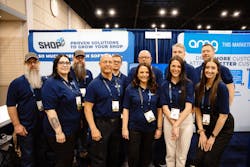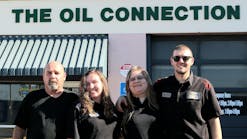Numbers don’t lie. If a quick lube or repair shop’s employees aren’t working well together, the bottom line takes a hit.
How can an owner keep their business from getting punched? Cultivate an ecosystem of success, says David Rogers, chief operations manager of Keller Bros. in Littleton, Colorado, an 11-bay repair shop that includes four lube bays, in business since 1974.
Clearly, Rogers’ formula—created alongside owner Terry Keller—works.
“In 1999, Keller Bros. was selected for the National Excellence Award,” Rogers says.
Motor Age Magazine also named Keller Bros. to its list of Top 10 Auto Repair Shops in the U.S. in 2009. The same year, the business was a top three finalist for the Better Business Bureau’s BBB Torch Award for ethics.
And today, the shop has spawned multiple successful auto industry businesses.
The Backstory
“Years ago, the fire marshal forced us to put up a firewall in our bays,” says Rogers. “Theoretically, all this did was add a wall and a door that split the bays into two, but in reality it created a rift in the team.”
Divided by the physical barrier, the shop’s techs started calling each other “East Siders” or “West Siders.” And essentially, the two camps stopped working well together and helping each other out.
“This meant my lube bay was cut off from half of my A-techs,” Rogers says. “Ultimately, I overcame the situation by creating games that rewarded techs for being as helpful as possible to all employees. But that experience has stuck with me ever since.”
The Challenge
While few businesses will come across a literal barrier to good employee business relations, other obstacles will arise. And even at Keller Bros., that proved to be the case.
Trust was a major factor that Rogers learned must be present between employees for a shop to run well.
“If technicians don’t trust the advisors to properly advise customers, they will pencil-whip inspections,” Rogers notes. “And when advisors don’t trust the recommendations, techs are making, they won’t educate the customer about everything the tech found.”
To remedy the distrust among ranks, the COO found that it was not enough to rely on intuition and instinct, which he calls “the secret sauce.”
“If you’re not already measuring your team’s performance, setting clear and realistic benchmarks, and monitoring the team’s progress every day, then you’re operating on intuition and instinct,” Rogers states.
Intuition and instinct, however, are a recipe that requires constant tending by an owner or manager, which is not sustainable, he found. Because the moment you take your eyes off employee dynamics and performance, things can start to slide backward again.
The Takeaway
Rogers learned that the best way to keep a watchful eye on employee dynamics at Keller Bros. was through measurement.
“Measurement shows me how frequently my top techs refer work to the lube bay and vice versa,” he says. “It shows me how my technicians are performing compared to one another, compared to the average technician on (shop management software), and compared to top technicians across the country.”
At Keller Bros., measurement became a critical key to unlocking incentive-based pay plans for employees.
“When a pay plan is built by an expert and designed to create behaviors that grow the shop, it means that the owner no longer has to be the secret sauce to ensure the culture is healthy and the shop is a productive and efficient environment,” Rogers explains. “Because now the employees have an incentive for creating that environment themselves.”
He also notes that pay plans don’t work in a vacuum: shops must set up marketing plans that draw in high-quality customers so that employees’ incentive pay plans have a chance to work.
“When the marketing you’re using is attracting customers who get angry when you advise them, that situation isn’t sustainable,” Rogers states. “The team will get discouraged that they can’t hit their goals and the whole shop environment will suffer.”
Circling back to good marketing, Rogers has learned throughout his years of operating Keller Bros. that marketing promises have to be fulfilled when a customer walks into your shop.
“Which means all these steps—the measurement, the incentives, the marketing—all depend on the people that you hire, the image your shop projects, and the culture you encourage,” he notes.
To make sure that the steps are working in alignment, Rogers recommends that owners ask themselves: Does your team understand what makes your shop different? Are they committed to that vision? And have you created an environment where everyone—the owner included—is honest and accountable?
The Aftermath
Today, Keller Bros. is in its 50th year of operation.
Years ago, when the company received its National Excellence Award, it was the springboard for Rogers and Keller to found Auto Profit Masters, a company that provides auto industry business owners with coaching, consulting, and teaching on all the things that lead to happy, productive employees and a healthy business.
“We resolved on day one that we would never teach or consult based on theory, but rather on the direct experience we had and continue to have while running a shop,” Rogers says.
This same mission led the two men to develop a shop management system, as well, called Shop4D, built with the same procedures and processes they use to successfully manage Keller Bros.
Another company, Automated Marketing Group, also sprang from the Keller Bros. executives.
“Our first coaching clients asked for a recommendation for who they should use for their marketing,” Rogers notes, “and we went on a national search to find somebody we could trust.”
When they couldn’t find a marketing group that fully understood auto repair customers, Keller and Rogers offered to do the marketing themselves, using the same approach that worked at Keller Bros.
In each of their businesses, Rogers says the two men have a goal of helping other shops create an ecosystem of success.
“The reason why Terry and I are still working together 27 years later … is our shared belief that shop owners and shop employees deserve better.” A sustainable business, he reasons, can reap the same results he has seen at Keller Bros, where everyone is taken care of—the owner’s family, the employees’ families, and the community around the shop.
“At Keller Bros. our employees know we’re more than just four walls and a door on Dry Creek Road, and our mission is more than just fixing cars,” Rogers says.







